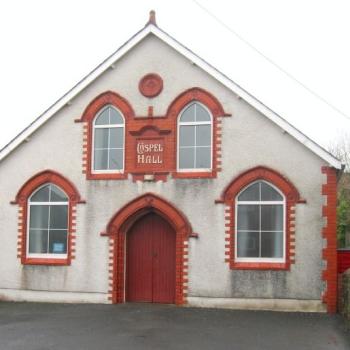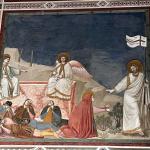This morning I attended the last session of the Leaders’ training track, Prophetic Encounter, led by Sam Poe and Phil Wilthew. Today’s session looked at “Pastors and Prophets Together Building the Church.” I also was able to get to the two previous sessions, which I summarized at these pages:
Sam serves on John Lanferman’s apostolic team in the USA. He and his wife, Marlene, have travelled widely, serving churches in the USA and other nations. In recent years they have been particularly involved in working together with churches in Russia and the Ukraine. Sam and Marlene are presently based in Tacoma, Washington, where they are part of a new church. Sam is also serving other churches related to Newfrontiers in that region.
Phil is married to Carole, has two children, and is an elder in City Church, Newcastle, UK. He serves churches prophetically, particularly in the north of the UK, and has a passion to develop prophetic teams.
More posts from this conference can be found on my TOAM08 label page. You can download the mp3s of this week’s talks by subscribing to the new Newfrontiers podcast, which will be an easy way for you to get access to the mp3s for free.
A prophet working in isolation can cause mayhem! But working with the local pastor produces both security and expansion in the people for whom he has responsibility.
 Sam Poe began by turning to 1 Thessalonians 5. “Test everything. Hold on to the good, avoid every kind of evil.”
Sam Poe began by turning to 1 Thessalonians 5. “Test everything. Hold on to the good, avoid every kind of evil.”
The focal point of prophetic ministry should be the local church. The application and expression of that ministry is in building up the church. What Paul says in 1 Thessalonians 5 will require not just the prophets, but those in authority—teachers and pastors working together to ensure that prophecy is tested, weighed, and applied.
Prophecy can bring encouragement, direction, and prediction of the future, as well as warnings and correction. Mandates of this text are about prophecy.
SOME IMPERATIVES IN THIS PASSAGE
Don’t quench the fire by disdaining or despising prophecy.
Because of the excesses, errors, and eccentricities, we can reject it because of this. Root the pictures in sound theology. We need elders who will pastor as leaders the prophetic. The central purpose of prophecy is to build up. They also have a foundational effort. Encouragement or exhortation—it’s about helping someone reach for a positive future. Don’t ever use prophecy to try to get somebody to do something you want them to do. Life is full of trouble; prophecy brings comfort, which is more of a prod to get you going forward and to strengthen you in the battle.
TEST them all.
All prophecy needs to be tested. Not to judge with a scowl on the face. The word in Greek is to examine something and evaluate it with the attitude or expectation of approving it, i.e. our attitude should not be cynical.
Maintain what is good — hold on to it.
This is good and we want to take it on board and take some steps. Otherwise it could be frustrating. Apostolic ministry and pastoral ministry are critical. Fan the flames.
Abstain from whatever is evil.
Sometimes something comes in the name of prophecy that’s not helpful. Sometimes there is no real weight in the prophecy.
HOW TO RECEIVE PROPHETS INTO THE LOCAL CHURCH
If you don’t have a well-established mature prophet in the life of the church, sometimes you may need to receive one of them. Ephesians 4:11 type prophets can help us lay firm foundations in the church. It’s the same foundation that they lay.
As the question, “Are they accountable to a local church and its leadership?” Don’t invite them if they aren’t! Every leader and ministry must be rooted into the life of a local church. Some are very trans-local and mobile, but where is home? Where do they come back to? Are they related to and working in a team with an apostolic ministry? They are meant to be working together. Find each other and be related to each other.
It’s important that the congregation has a clear biblical understanding of the place and value of prophetic ministry in the local church.
 Phil Wilthew then added to this. Pastors and prophets are very different people. Pastors and prophets have the same job description –—i.e. to reveal Jesus. There are five ways this can work well.
Phil Wilthew then added to this. Pastors and prophets are very different people. Pastors and prophets have the same job description –—i.e. to reveal Jesus. There are five ways this can work well.
Recognize differences.
God designed us to be different and complementary. Don’t be too quick to compartmentalize. We are a blend of gifts. Gifts are colors and shades, but not boxes. Pastors tend to be warm, loving, create unity, security, strength, consolidate, provide strong foundations, are measured and well rounded, not given to extremes, cautious of change, patient, good for the long haul with no short sharp fixes. They are amazing gifts to the church. Prophets are the perfect foil for all those characteristics, — they are direct, love change, can get frustrated with the status quo, look at what’s ahead, find it hard to live in the hear and now as they are looking ahead, don’t like maintaining and consolidating; they are impulsive, defensive, attacking, not measured, and dislike caution. Again an amazing gift to the church. There is a great potential for synergy, and also for challenge between them. Self-awareness is a great gift.
Practice love.
It’s simple, but worth saying again. Neither circumcision or uncircumcision has any value. The only thing that counts is faith expressing itself through love. If you don’t have love, you are a painful cymbal. It’s not emotional, it’s something we do. Chemistry is important, but express faith and practice love. Don’t be right all the time.
Love enables honest communication.
Love enables you to talk honestly with each other. But can rebuke, spell out what’s what. Too many people have high honesty, but shallow relationships. Paul opposed Peter face-to-face. Don’t send an e-mail! Look in the whites of their eyes and realize I “need to talk to you honestly.” Gather pastors with prophetically gifted guys in the church into groups, teams. In times of frustration, don’t be impulsive in your communication. Utilize communication, especially with prophetic people who have gone silent and found a cave to hide in!
Develop proper teams.
The first is a mixed-gift team. Be with guys who are not like you. Cover weaknesses. Also need same-gift teams, too. So we need to mix it up and have different combinations.
Play to your strengths.
We need to look to change the areas where w
e are lacking. But, we will be most effective by getting better at what we are already good at. Get better at your gift.
Give good feedback to good prophetic people in your church. The worst thing for most prophetic people is silence. Do it in the meeting. “I just want to say thank you so much to the prophetic people who shared this morning. I was particularly blessed by this …” Also, provide personal feedback, e.g. “Thank you so much for sharing. Next time something that might really help you would be if you would talk slower and more clearly.”
Don’t always translate frustration as rebellion, or that they are out of kilter. It’s their job to plow things up. He hears God and mercilessly questions everything. A prophet is therefore seen as a threat and wants movement now. He is not a troubler. Ask prophetic folk what they are hearing. Work on the character of prophetic people in your church. Character training is of highest value. Rigorously challenge prophetic people on their time with God. Understand that accuracy is learned and developed over time. Need very positive encouragement and help.















